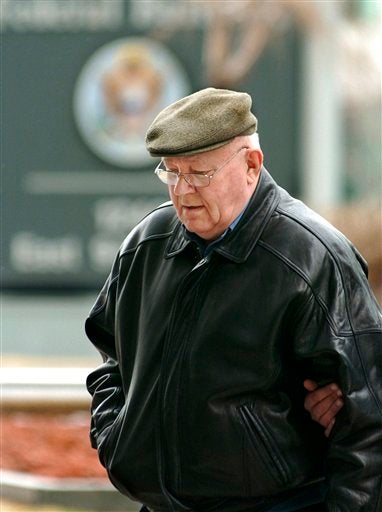Nazi guard suspect Demjanjuk arrives in Germany

Your support helps us to tell the story
From reproductive rights to climate change to Big Tech, The Independent is on the ground when the story is developing. Whether it's investigating the financials of Elon Musk's pro-Trump PAC or producing our latest documentary, 'The A Word', which shines a light on the American women fighting for reproductive rights, we know how important it is to parse out the facts from the messaging.
At such a critical moment in US history, we need reporters on the ground. Your donation allows us to keep sending journalists to speak to both sides of the story.
The Independent is trusted by Americans across the entire political spectrum. And unlike many other quality news outlets, we choose not to lock Americans out of our reporting and analysis with paywalls. We believe quality journalism should be available to everyone, paid for by those who can afford it.
Your support makes all the difference.Suspected Nazi death camp guard John Demjanjuk arrived in Germany today to face a warrant accusing him of being accessory to the murder of 29,000 Jews and others.
The retired Ohio autoworker was deported from the United States and arrived at about 9:15 a.m. (0715 GMT) aboard a private jet at Munich's airport. The plane taxied directly into a hangar, accompanied by police vehicles and an ambulance.
The 89-year-old, who is allegedly in poor health, was expected to be taken directly to Munich's Stadelheim prison, where he will be kept in a special medical unit. There, he will be formally arrested and a doctor will check his condition.
The Ukrainian-born Demjanjuk says he was a Red Army soldier who was captured by the Nazis, spent the rest of the war as their prisoner and never hurt anyone.
There are Nazi-era documents that suggest otherwise — including a photo ID identifying Demjanjuk as a guard at the Sobibor death camp and saying he was trained at an SS facility for Nazi guards at Trawniki. Both sites were in Nazi-occupied Poland.
The key to Demjanjuk's fate may not lie with the evidence but rather on a German court's decision about whether he is medically fit to stand trial. In any case, Demjanjuk, who has been without a country since the US stripped him of his citizenship in 2002, is likely to spend the rest of his life in Germany, either in jail or in a home for the elderly.
Germany's main Jewish leader, Charlotte Knobloch, told ARD television that Demjanjuk needs to be brought to trial.
"War crimes of the kind Demjanjuk has been accused of do not fall under the statute of limitations," Knobloch said.
"I hope he receives the punishment he deserves."
One of Demjanjuk's German lawyers, Guenther Maull, told AP Television News on Monday that at Stadelheim, a judge will read a 21-page arrest warrant to him. Demjanjuk will have the opportunity to respond, but is not expected to say anything.
"I will put pressure on him not to say anything, because we need to talk in peace first and digest everything that is in the arrest warrant," Maull said.
As for his health, a doctor will examine Demjanjuk and a decision will be taken as to whether he should remain at Stadelheim or be sent to an area hospital.
"If he is sick they first have to try to cure him. If he is incurably sick they have to find a place for him to live," Maull said.
Dramatic photos last month showed Demjanjuk (pronounced dem-YAHN'-yuk) wincing in apparent pain as he was removed by immigration agents from his home in Seven Hills, Ohio, in an earlier attempt to deport him to Germany. However, images taken only days earlier and released by the US government showed him entering his car unaided outside a medical office.
Demjanjuk's son, John Demjanjuk Jr., said Monday that his father is dying of leukemic bone marrow disease.
The deportation came four days after the US Supreme Court refused to consider Demjanjuk's request to block deportation and about 3 1/2 years after he was last ordered deported.
Throughout three decades of court action in the US and Israel, Demjanjuk has insisted he is an innocent victim.
Among the documents obtained by the Munich prosecutors is an SS identity card that features a photo of a young, round-faced Demjanjuk along with his height and weight, and says he worked at Sobibor.
German prosecutors also have a transfer roster that lists Demjanjuk by his name and birthday and also says he was at Sobibor, and statements from former guards who remembered him being there.
The case dates to 1977 when the Justice Department moved to revoke Demjanjuk's US citizenship, alleging he hid his past as a Nazi death camp guard.
Demjanjuk had been tried in Israel after accusations surfaced that he was the notorious "Ivan the Terrible" at the Treblinka death camp in Poland. He was found guilty in 1988 of war crimes and crimes against humanity but the conviction was overturned by the Israeli Supreme Court.
A US judge revoked his citizenship in 2002 based on US Justice Department evidence showing he concealed his service at Sobibor and other Nazi-run death and forced-labor camps.
An immigration judge ruled in 2005 he could be deported to Germany, Poland or Ukraine. Munich prosecutors issued an arrest warrant for him in March.
Join our commenting forum
Join thought-provoking conversations, follow other Independent readers and see their replies
Comments